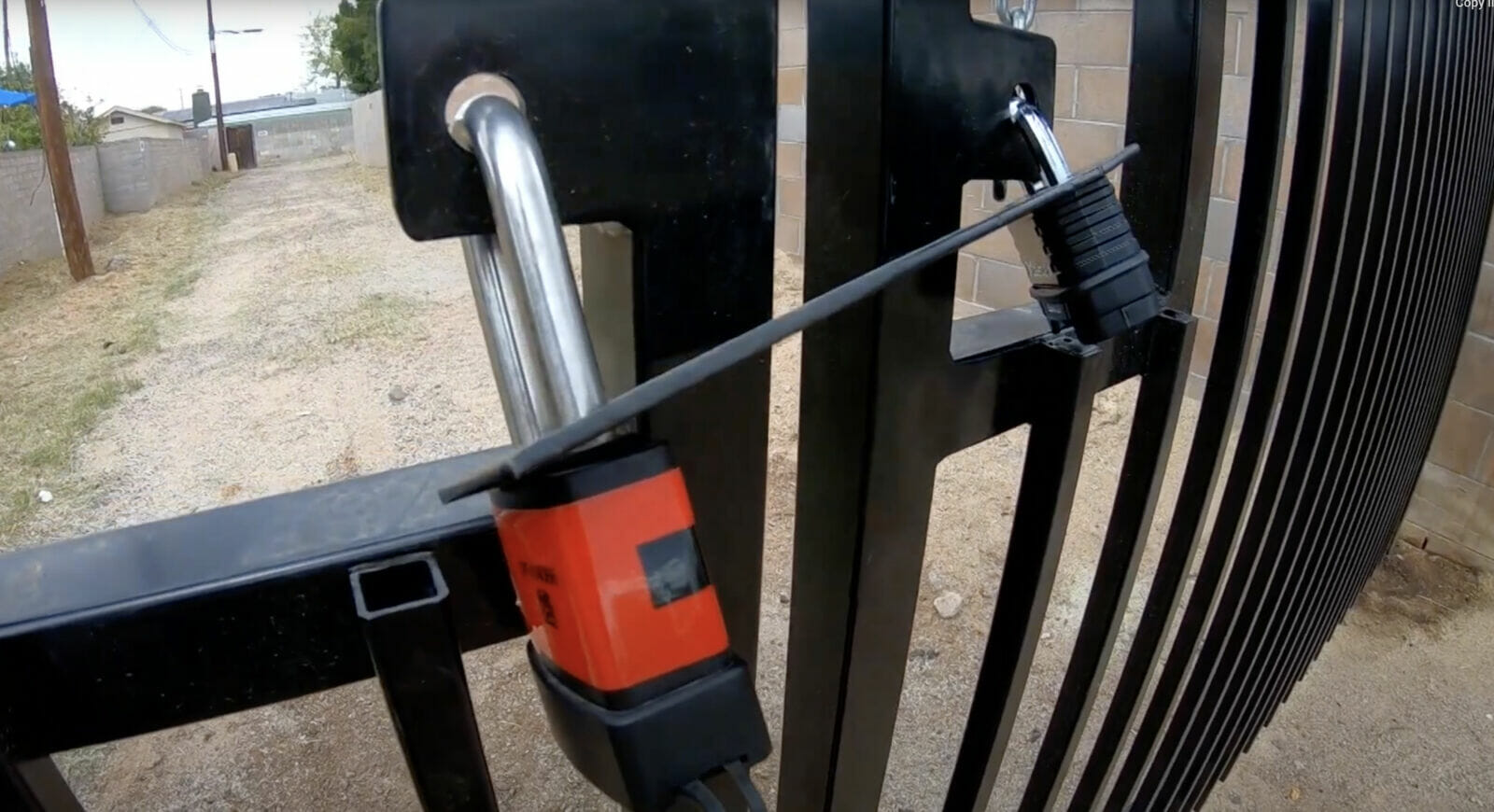The Gated Alley Program in Phoenix was created in 2017 to reduce crimes in residential areas, crimes such as illegal dumping and trespassing.
The Gated Alley Pilot Program was implemented to install gates in back-alley ways behind residential homes to limit public access as an attempt to make neighborhoods safer. The Royal Palm neighborhood was the first neighborhood to have gate installations where they fundraised and used the Neighborhood Block Watch Grant funds.
DEEPER DIVE: New pay structure makes Phoenix police highest paid in Arizona
The Royal Palm Neighborhood is bounded by 7th and 19th Avenue near 15th going from northern to Dunlap.
The Royal Palm Neighborhood Council President Hillary Rusk and member Luke Bevans requested the City of Phoenix to install gates in their alleys to prevent illegal trash dumping, loitering, and other crimes.
There was an incident that occurred in the neighborhood where a man was riding a bike and jumped over a neighbor’s wall into their backyard and exposed himself to young children, which prompted the push to close alleyways. Installing gates in alleys would deter people from entering.
“Hillary and I reached out to Councilwoman Debra Stark’s office, and we met with the City of Phoenix and the planning, we worked really hard to get this program in place,” Bevans said.
Councilwoman Debra Stark was dedicated and very involved with various departments to make the program happen and essentially push to expand the program citywide.
After the backyard incident with a neighbor and them also being a friend of Bevans. Bevans upgraded his camera systems and dedicated two cameras to just the alleyways to monitor the activity throughout the day. He started compiling screenshots and videos of the alleyway.
“So, me installing those cameras, I think really helped push this program along because I was able to provide visual evidence to city council and neighbors,” Bevans said. “Compiling all this evidence if you will, was pretty eye-opening to a lot of people in our community, it’s not just my alley, it’s all the alleys, Bevans added.
“We needed to get 51% of the neighbors who share this alley on board which was a lot more difficult than I anticipated,” Bevans said.
Bevans and a couple of other neighbors that were in support of the closures went around and knocked on doors and handed out pamphlets they made of alleyway activity.
“We did have people that were petitioning against the alley gates, but we did end up getting just 51 percent,” Bevans said.
Many neighbors had concerns about the potential gate installations. Some common concerns were residents having to move their trash from the alleys to the front of their houses for pickup. Whether or not residents, utility companies, and fire would have access to the alleys and alley maintenance. Another concern was if there was a gate installed, the possibility of someone hopping over the gate, now being enclosed can camp out.
“At the end of the day, if the trade-off was, we have to move our trash to the street in order to prevent people from being in our backyard. I wasn’t comfortable with my kids playing in the backyard unsupervised and that’s not ok with me,” Bevans said.
“When we did the pilot program it was up to us to design our gates and then they expanded the program, for simplicity they got a contractor to do the broad iron gates,” Rusk said.
There is an architect that lives in the neighborhood that designed the customized gates for free. The gates are heavy-duty and industrial looking and included a roll bar at the top, which makes it hard for people to grab.
Patricia Rodriguez, another resident from Royal Palm Neighborhood has an alley behind her home located near 19th and northern were not originally a part of the pilot program but were able to get a gate installed.
“I found out about it because we have an active community, and I did go to a meeting for people who were in the program to find out what it was about and then started the whole process,” Rodriguez said.
She has lived in the neighborhood for almost 19 years and has always had many issues with the alley and being located near a shopping center and the light rail also contributed to the problem.
“Sometimes it would just be people who needed a place for some shade which was understandable but then it became other things. People were using it as a restroom, drug use, people were sleeping, and jumping into people’s yards and fires,” Rodriguez said.
The neighborhood had people jumping the walls and multiple break-ins. Neighbors helped clean the alley as a community, where they would find needles, building materials, trash, mattresses, and clothing.
“We were cleaning it up constantly just to have it become really dirty again, very quickly. It was years of calling the police and not feeling safe in my own home,” Rodriguez said.
Rodriguez also had to submit her request, petition and gather signatures, and fundraise for funds.
“Our alley was not used for trash as other alleys are so that wasn’t an issue, we were already used to putting out trash in the front,” Rodriguez said.
Royal Palm Neighborhood’s first gate was installed back in 2018 and has a total of 12 gates in six alleys. All the gate installations did run smoothly, the only issues were the locks.
The first time around the gates had locks and neighbors whose house resided there had access. They were given a key to access the gate. Apparently, not everyone was given a key and some keys were lost. The city resolved the issue by switching to a single lock combination instead.
Royal Palm has customized gates installed, but because of the expansion of the program and for simplicity, they are continuing the program with non-customized gates installations.
“I went back to the city and said, we want to stay in this program, and we have more people who want gates, and the custom gates we can get installed for pretty similar pricing, first they told me no, but I pushed and pushed, and they told me they’ll figure out a way to make it work,” Rusk said.
The first phase attracted many requests from other neighborhoods for gate installations. Due to the high demand of neighborhood requests in September of 2022, the City Council approved the program for a city program rather than a Neighborhood Grant Program. The program was approved $500,000 in funds to install gates for an estimated 45 alley segments.
The Neighborhood Services Department recently gave an update on the Gated Alley Program presented during the Community and Cultural Investment Subcommittee earlier this year in February.
At the beginning of the 2023, the Gated Alley Program received 137 requests. The City of Phoenix were able to approve 46 alley segments leaving 91 requests remaining. 32 are eligible; 14 are not eligible because of the alley locations’ conditions; 45 are still under review.
The Gated Alley Program Manager, Greg Gonzalez stated, “There’s a need but we do the best to fulfill what is needed with limited funds.”
Listed on the City of Phoenix website is the Gated Alley Program Request form, and the program page provides all the eligibility requirements.




